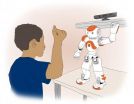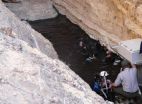(Press-News.org) Highlights
When dialysis patients reported discussions about transplantation with clinicians, they had a nearly 3-fold increased likelihood of being listed for transplantation, but clinician-reported discussions did not increase a patient's likelihood of being listed.
In almost one-third of cases, clinicians reported that they had discussed transplantation with a particular dialysis patient, but the patient said that nobody had discussed it with them.
Washington, DC (August 28, 2014) — In a study of dialysis patients, those who reported that they had discussed the option of transplantation with clinicians were more likely to be put on the transplant waiting list; however, clinician-reported discussions of transplantation did not increase patients' likelihood of being waitlisted. The findings, which appear in an upcoming issue of the Journal of the American Society of Nephrology (JASN), indicate that better ways of informing patients about kidney transplantation may be needed.
One of the key principles of informed consent is describing alternative treatments. So when starting someone on hemodialysis, it is imperative to discuss the alternatives to hemodialysis, for example peritoneal dialysis and kidney transplantation. The Centers for Medicare & Medicaid Services (CMS) believe the discussion of kidney transplantation is so important that they mandate it. Unfortunately, though, there is no guidance as to what kind of discussion is required.
Dorry Segev, MD, PhD (Johns Hopkins University School of Public Health) and his colleagues asked 388 patients if providers (kidney specialists or dialysis staff) had discussed transplantation with them, and then they looked to see whether the providers reported to CMS that they had discussed transplantation with those patients.
The investigators discovered that in almost one-third of cases, providers reported to CMS that they had discussed transplantation with a particular patient, but the patient said that nobody had discussed it with them. Such discussions were reported by both patient and provider for 56.2% of participants, by provider only for 27.8%, by patient only for 8.3%, and by neither for 7.7%.
The researchers also discovered that patient-reported discussions about transplantation were associated with a nearly 3-fold increased likelihood that patients would be listed for transplantation, but provider-reported discussions did not increase a patient's likelihood of being listed. In other words, it didn't matter if the provider reported discussing transplantation with the patient; it was only if the patient reported receiving this information that led to him or her to being referred for and listed for a transplant.
"This is a critical lesson for quality improvement in the care of patients with end-stage kidney disease: it's not enough to ask physicians if they provided information to the patient, but rather we need to be asking the patient, because there is major discordance between patient and provider reports, and only the patient report was associated with the expected clinical behavior," said Dr. Segev.
In an accompanying editorial, Mark Unruh, MD (University of New Mexico School of Medicine) and Mary Amanda Dew, PhD (University of Pittsburgh School of Medicine and Medical Center) noted that that "even the best educational efforts will be for naught if the patient does not take in the information or understand it." They cautioned, however, that the form submitted to CMS has been recognized as providing an important but inexact snapshot of patients with kidney failure and other conditions. They also stressed that providing kidney transplant information likely requires repeated discussions when patients are open and able to receive it.
INFORMATION:
Study co-authors include MeganSalter, Babak Orandi, Mara McAdams-DeMarco, Andrew Law, Lucy Meoni, Bernard Jaar, Stephen Sozio, Wen Hong Linda Kao, Rulan Parekh, and Dorry Segev.
Disclosures: The authors reported no financial disclosures.
The article, entitled "Patient- and Provider-Reported Information about Transplantation and Subsequent Waitlisting," will appear online at http://jasn.asnjournals.org/ on August 28, 2014.
The editorial, entitled Asking Dialysis Patients About What They Were Told: A New Strategy for Improving Access to Kidney Transplantation?" will appear online at http://jasn.asnjournals.org/ on August 28, 2014.
The content of this article does not reflect the views or opinions of The American Society of Nephrology (ASN). Responsibility for the information and views expressed therein lies entirely with the author(s). ASN does not offer medical advice. All content in ASN publications is for informational purposes only, and is not intended to cover all possible uses, directions, precautions, drug interactions, or adverse effects. This content should not be used during a medical emergency or for the diagnosis or treatment of any medical condition. Please consult your doctor or other qualified health care provider if you have any questions about a medical condition, or before taking any drug, changing your diet or commencing or discontinuing any course of treatment. Do not ignore or delay obtaining professional medical advice because of information accessed through ASN. Call 911 or your doctor for all medical emergencies.
Founded in 1966, and with more than 14,000 members, the American Society of Nephrology (ASN) leads the fight against kidney disease by educating health professionals, sharing new knowledge, advancing research, and advocating the highest quality care for patients.
Study finds shortcomings in doctor-patient discussions about transplantation
Discordance between patient and provider reports of such discussions is high
2014-08-29
ELSE PRESS RELEASES FROM THIS DATE:
Complications of tube insertion in ears not worse for kids with cleft lip/palate
2014-08-28
Bottom Line: Children with cleft lip and/or palate (CLP) have no worse complications from ventilation tube (VT) insertion in their ears to treat otitis media with effusion (OME, a buildup of fluid in the ear) or acute otitis media (AOM, a common ear infection), two conditions which can result in hearing loss.
Author: Ian Smillie, M.R.C.S. Ed., of the Royal Hospital for Sick Children, Glasgow, Scotland, and colleagues.
Background: CLP is a common birth defect in children, occurring in 1 of 700 births. Optimizing hearing in children with CLP is important to avoid problems ...
Socially-assistive robots help kids with autism learn by providing personalized prompts
2014-08-28
LOS ANGELES - August 28, 2014: This week, a team of researchers from the USC Viterbi School of Engineering will share results from a pilot study on the effects of using humanoid robots to help children with autism practice imitation behavior in order to encourage their autonomy. Findings from the study, entitled "Graded Cueing Feedback in Robot-Mediated Imitation Practice for Children with Autism Spectrum Disorders," will be presented at the 23rd IEEE International Symposium on Robot and Human Interactive Communication (RO-MAN) conference in Edinburgh, Scotland, on Aug. ...
Flapping baby birds give clues to origin of flight
2014-08-28
How did the earliest birds take wing? Did they fall from trees and learn to flap their forelimbs to avoid crashing? Or did they run along the ground and pump their "arms" to get aloft?
The answer is buried 150 million years in the past, but a new University of California, Berkeley, study provides a new piece of evidence – birds have an innate ability to maneuver in midair, a talent that could have helped their ancestors learn to fly rather than fall from a perch.
The study looked at how baby birds, in this case chukar partridges, pheasant-like game birds from Eurasia, ...
Prions can trigger 'stuck' wine fermentations, researchers find
2014-08-28
A chronic problem in winemaking is "stuck fermentation," when yeast that should be busily converting grape sugar into alcohol and carbon dioxide prematurely shuts down, leaving the remaining sugar to instead be consumed by bacteria that can spoil the wine.
A team of researchers including UC Davis yeast geneticist Linda Bisson has discovered a biochemical communication system behind this problem. Working through a prion -- an abnormally shaped protein that can reproduce itself -- the system enables bacteria in fermenting wine to switch yeast from sugar to other food sources ...
Researchers use NASA and other data to look into the heart of a solar storm
2014-08-28
A space weather storm from the sun engulfed our planet on Jan. 21, 2005. The event got its start on Jan. 20, when a cloud of solar material, a coronal mass ejection or CME, burst off the sun and headed toward Earth. When it arrived at our planet, the ring current and radiation belts surrounding Earth swelled with extra particles, while the aurora persisted for six hours. Both of these are usually signs of a very large storm – indeed, this was one of the largest outpouring of solar protons ever monitored from the sun. But the storm barely affected the magnetic fields around ...
After Great Recession, Americans are unhappy, worried, pessimistic, Rutgers study finds
2014-08-28
NEW BRUNSWICK, N.J. – The protracted and uneven recovery from the Great Recession has led most Americans to conclude that the U.S. economy has undergone a permanent change for the worse, according to a new national study at Rutgers. Seven in 10 now say the recession's impact is permanent, up from half in 2009 when the recession officially ended, according to the John J. Heldrich Center for Workforce Development.
Among key findings in "Unhappy, Worried and Pessimistic: Americans in the Aftermath of the Great Recession," the center's latest Work Trends report, are:
Despite ...
A VA exit strategy
2014-08-28
LEBANON, NH – As the federal government plans its exit strategy from the war, now may be the time for it to rethink its role in providing health care to veterans, says a Perspective piece in the New England Journal of Medicine.
"To simply go on doing more of the same is to fail to recognize the challenge that the Veterans Health Administration's cost and population structure pose in the longer run," said William Weeks, from The Dartmouth Institute for Health Policy & Clinical Practice, and David Auerbach, from the RAND Corporation, in the August issue of NEJM.
The ...
The universal 'anger face'
2014-08-28
The next time you get really mad, take a look in the mirror. See the lowered brow, the thinned lips and the flared nostrils? That's what social scientists call the "anger face," and it appears to be part of our basic biology as humans.
Now, researchers at UC Santa Barbara and at Griffith University in Australia have identified the functional advantages that caused the specific appearance of the anger face to evolve. Their findings appear in the current online edition of the journal Evolution and Human Behavior.
"The expression is cross-culturally universal, and even ...
Climate change puts endangered Devils Hole pupfish at risk of extinction
2014-08-28
RENO, Nev. – Climate change is hurting reproduction of the endangered Devils Hole pupfish, threatening the survival of this rare species that has numbered as few as 35 individuals, new research by the University of Nevada, Reno and Desert Research Institute shows.
Scientists report that geothermal water on a small shelf near the surface of an isolated cavern in the Nevada desert where the pupfish live is heating up as a result of climate change and is likely to continue heating to dangerous levels.
The hotter water, which now reaches more than 93 degrees, has shortened ...
Deadly remedy: Warning issued about Chinese herbal medicine
2014-08-28
A herbal preparation prescribed by a Chinese herbal medication practitioner in Melbourne for back pain resulted in life-threatening heart changes, prompting a team of intensive care and emergency physicians to call for appropriate patient education by practitioners who prescribe complementary medications.
Writing in Emergency Medicine Australasia, the journal of the Australasian College for Emergency Medicine, emergency medicine trainees Dr Angelly Martinez and Dr Nicky Dobos from the Intensive Care Unit at the Royal Melbourne Hospital and emergency medicine trainee Dr ...
LAST 30 PRESS RELEASES:
University of Miami business technology department ranked No. 1 in the nation for research productivity
Researchers build ultra-efficient optical sensors shrinking light to a chip
Why laws named after tragedies win public support
Missing geomagnetic reversals in the geomagnetic reversal history
EPA criminal sanctions align with a county’s wealth, not pollution
“Instead of humans, robots”: fully automated catalyst testing technology developed
Lehigh and Rice universities partner with global industry leaders to revolutionize catastrophe modeling
Engineers sharpen gene-editing tools to target cystic fibrosis
Pets can help older adults’ health & well-being, but may strain budgets too
First evidence of WHO ‘critical priority’ fungal pathogen becoming more deadly when co-infected with tuberculosis
World-first safety guide for public use of AI health chatbots
Women may face heart attack risk with a lower plaque level than men
Proximity to nuclear power plants associated with increased cancer mortality
Women’s risk of major cardiac events emerges at lower coronary plaque burden compared to men
Peatland lakes in the Congo Basin release carbon that is thousands of years old
Breadcrumbs lead to fossil free production of everyday goods
New computation method for climate extremes: Researchers at the University of Graz reveal tenfold increase of heat over Europe
Does mental health affect mortality risk in adults with cancer?
EANM launches new award to accelerate alpha radioligand therapy research
Globe-trotting ancient ‘sea-salamander’ fossils rediscovered from Australia’s dawn of the Age of Dinosaurs
Roadmap for Europe’s biodiversity monitoring system
Novel camel antimicrobial peptides show promise against drug-resistant bacteria
Scientists discover why we know when to stop scratching an itch
A hidden reason inner ear cells die – and what it means for preventing hearing loss
Researchers discover how tuberculosis bacteria use a “stealth” mechanism to evade the immune system
New microscopy technique lets scientists see cells in unprecedented detail and color
Sometimes less is more: Scientists rethink how to pack medicine into tiny delivery capsules
Scientists build low-cost microscope to study living cells in zero gravity
The Biophysical Journal names Denis V. Titov the 2025 Paper of the Year-Early Career Investigator awardee
Scientists show how your body senses cold—and why menthol feels cool
[Press-News.org] Study finds shortcomings in doctor-patient discussions about transplantationDiscordance between patient and provider reports of such discussions is high




